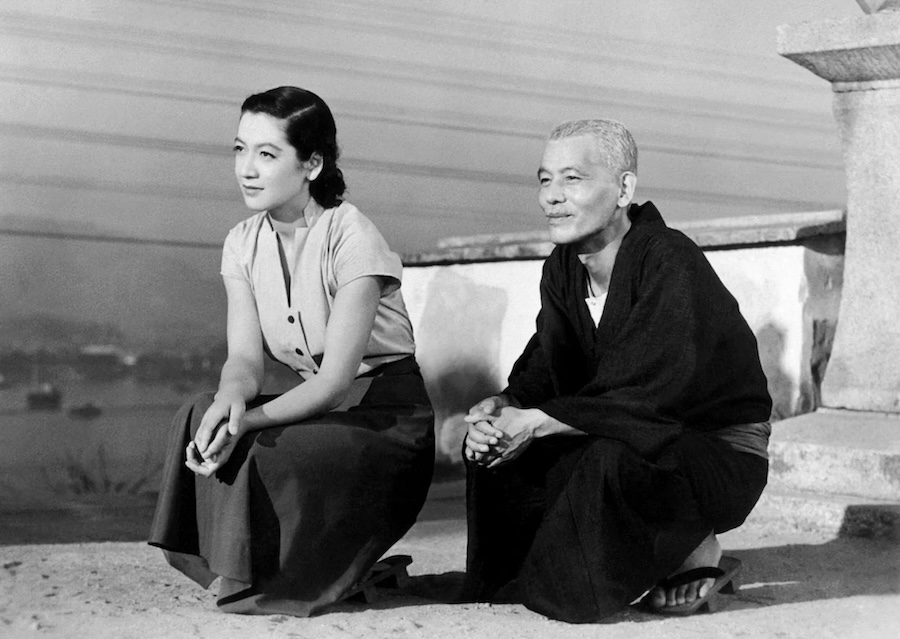

When I saw Michael Haneke’s Amour earlier this year I felt a sudden urge to pay a couple of older relatives a visit. Watching Yasujiro Ozu’s classic film Tokyo Story, which remained “undiscovered” by Western audiences for many years, certainly makes me think of people that are even closer – my own parents. There is so much here that feels universal even though it also offers a unique look into Japanese postwar society, something that was obviously not seen much in Western cinemas at the time.
Traveling to Tokyo
Shukishi and Tomi Hirayami (Chishu Ryu, Chieko Higashiyama) are a retired couple that will soon turn 70 years old. They live in Onomichi, a town close to Hiroshima, and they have decided to travel to Tokyo where their son Koichi (So Yamamura) and daughter Shige (Haruko Sugimura) live with their families; there’s also Noriko (Setsuko Hara) who was married to another of the Hirayami boys who was killed in World War II. When the couple arrives in Tokyo, both Koichi and Shige try to come up with ways to keep them busy and entertained, even booking them into a spa in the city of Atami.
When they come back early from that experience, their children (a pediatrician and an owner of a hair salon) are stressed, simply because they feel they don’t have much time to spend with their parents. However, Noriko is pleased to have them as guests and refuses to let her work get in the way…
Very non-sentimental approach
Director Ozu started his career already in the silent era. His and Kôgo Noda’s scripts usually dealt with issues between generations and family members. When Akira Kurosawa’s movies became famous worldwide, Ozu quietly made films that looked very different, employing camera angles and set-ups that usually put the audience at a lower height, as if we were watching the drama kneeling on a tatami mat. He would also frequently avoid showing us some of the story’s most critical moments onscreen, only letting us know that they had occurred and sharing the aftermath.
The result is a very non-sentimental approach, but Tokyo Story is nonetheless a powerful and moving tale that offers a lot of food for thought. Those of us who have older parents alive recognize how difficult it is sometimes to have them over for a few days; both generations try to adjust to an unusual situation. The film makes a moving point about how Koichi and Shige should spend more time with their parents before it’s too late, and also, ironically, how Noriko cares for them even though she’s not really related to them. There’s a great scene near the end where her brave façade finally falls and she admits that life as a widow is not so easy. At the same time, the portrayal of the children is not black-and-white; it’s easy to understand what their lives look like now, and that sympathy is also expressed by Tomi – who has likely experienced the same thing when she was young.
Yasujiro Ozu handles his simple, brittle drama with the utmost delicacy.
Ozu handles his simple, brittle drama with the utmost delicacy, and composer Takanobu Saito has written a beautiful, understated score that tugs at our hearts at just the right time.
Young meets old, which is evident in the spa sequence where Koichi and Shige haven’t even taken the time to pick a place for their parents that is not dominated by hard-partying twentysomethings. It’s not always easy to remember, but it doesn’t matter where or when this story takes place. Ozu knows exactly how to make sure we suffer if we don’t take proper care of the ones who brought us into this world.
Tokyo Story 1953-Japan. 134 min. B/W. Directed by Yasujiro Ozu. Screenplay: Kôgo Noda, Yasujiro Ozu. Cinematography: Yûharu Atsuta. Music: Takanobu Saito. Cast: Chishu Ryu (Shukishi Hirayama), Chieko Higashiyama (Tomi Hirayama), So Yamamura (Koichi Hirayama), Haruko Sugimura (Shige Kaneko), Setsuko Hara, Kuniko Miyake.
Trivia: Original title: Tokyo monogatari. Inspired by the American film Make Way for Tomorrow (1937). Hara also played Noriko in two earlier Ozu films, Late Spring (1949) and Early Summer (1951).
Last word: “By the time [Ozu] had finished writing a script, after about four months’ effort, he had made up every image in every shot, so that he never changed the scenario after we went on the set. And the words were so polished up that he would not allow us even a single mistake. […] [He] had made up the complete picture in his head before he went on the set, so that all we actors had to do was to follow his directions, from the way we lifted and dropped our arms to the way we blinked our eyes. […] Even if I did not know what I was doing and how those shots would be connected in the end, when I looked at the first screening I was often surprised to find my performance far better than I had expected.” (Ryu, Sight and Sound)
